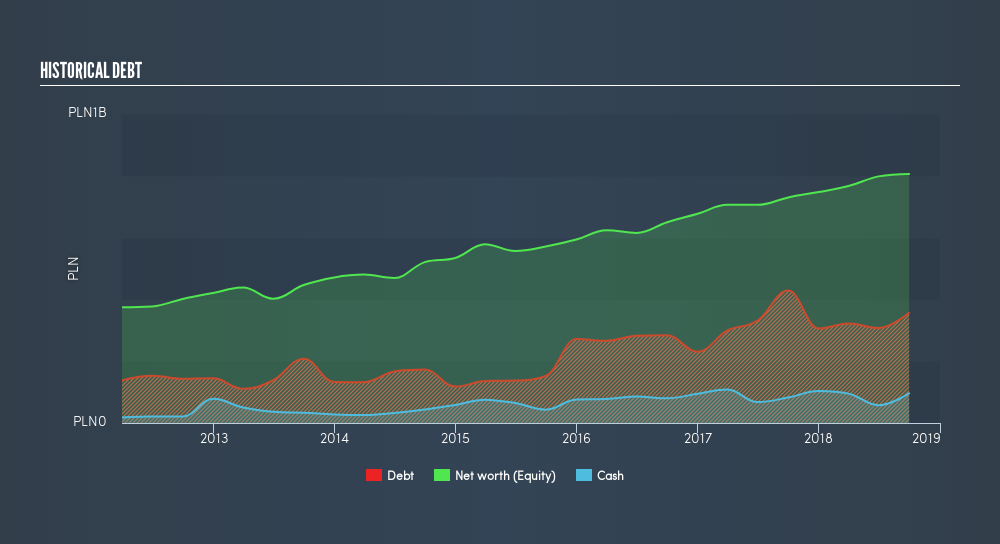- Poland
- /
- Consumer Durables
- /
- WSE:AMC
What You Should Know About Amica S.A.'s (WSE:AMC) Financial Strength

Amica S.A. (WSE:AMC) is a small-cap stock with a market capitalization of zł1.1b. While investors primarily focus on the growth potential and competitive landscape of the small-cap companies, they end up ignoring a key aspect, which could be the biggest threat to its existence: its financial health. Why is it important? Evaluating financial health as part of your investment thesis is essential, since poor capital management may bring about bankruptcies, which occur at a higher rate for small-caps. The following basic checks can help you get a picture of the company's balance sheet strength. However, this is just a partial view of the stock, and I suggest you dig deeper yourself into AMC here.
AMC’s Debt (And Cash Flows)
AMC has shrunk its total debt levels in the last twelve months, from zł428m to zł357m – this includes long-term debt. With this debt repayment, AMC currently has zł96m remaining in cash and short-term investments , ready to be used for running the business. On top of this, AMC has produced cash from operations of zł173m during the same period of time, leading to an operating cash to total debt ratio of 48%, signalling that AMC’s current level of operating cash is high enough to cover debt.
Can AMC meet its short-term obligations with the cash in hand?
Looking at AMC’s zł881m in current liabilities, the company has been able to meet these commitments with a current assets level of zł1.2b, leading to a 1.37x current account ratio. The current ratio is calculated by dividing current assets by current liabilities. For Consumer Durables companies, this ratio is within a sensible range as there's enough of a cash buffer without holding too much capital in low return investments.

Is AMC’s debt level acceptable?
With debt reaching 44% of equity, AMC may be thought of as relatively highly levered. This is somewhat unusual for small-caps companies, since lenders are often hesitant to provide attractive interest rates to less-established businesses. We can check to see whether AMC is able to meet its debt obligations by looking at the net interest coverage ratio. A company generating earnings before interest and tax (EBIT) at least three times its net interest payments is considered financially sound. In AMC's, case, the ratio of 16.29x suggests that interest is comfortably covered, which means that lenders may be inclined to lend more money to the company, as it is seen as safe in terms of payback.
Next Steps:
Although AMC’s debt level is towards the higher end of the spectrum, its cash flow coverage seems adequate to meet obligations which means its debt is being efficiently utilised. This may mean this is an optimal capital structure for the business, given that it is also meeting its short-term commitment. Keep in mind I haven't considered other factors such as how AMC has been performing in the past. You should continue to research Amica to get a better picture of the small-cap by looking at:
- Future Outlook: What are well-informed industry analysts predicting for AMC’s future growth? Take a look at our free research report of analyst consensus for AMC’s outlook.
- Valuation: What is AMC worth today? Is the stock undervalued, even when its growth outlook is factored into its intrinsic value? The intrinsic value infographic in our free research report helps visualize whether AMC is currently mispriced by the market.
- Other High-Performing Stocks: Are there other stocks that provide better prospects with proven track records? Explore our free list of these great stocks here.
We aim to bring you long-term focused research analysis driven by fundamental data. Note that our analysis may not factor in the latest price-sensitive company announcements or qualitative material.
If you spot an error that warrants correction, please contact the editor at editorial-team@simplywallst.com. This article by Simply Wall St is general in nature. It does not constitute a recommendation to buy or sell any stock, and does not take account of your objectives, or your financial situation. Simply Wall St has no position in the stocks mentioned. Thank you for reading.
About WSE:AMC
Amica
Engages in the production and sale of household appliances in Poland and internationally.
Excellent balance sheet with reasonable growth potential.
Market Insights
Community Narratives





